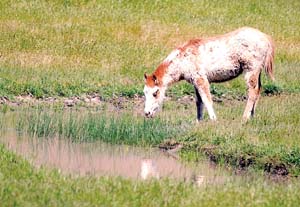As the West Nile Virus weaves its way up California’s Central
Valley, San Benito County has no official agency directly dealing
with the possible threat.
As the West Nile Virus weaves its way up California’s Central Valley, San Benito County has no official agency directly dealing with the possible threat.
However, health officials will “fight the bite” at an educational staff meeting this week, with hopes that possible aid from neighboring counties, along with communication within the county, will curtail any major complications this summer.
Officials with the San Benito County Public Health Department, environmental health department and individuals on the county’s communicable disease team will meet Wednesday to discuss issues of public education and other avenues to assist county residents if the virus strikes this summer, said Muree Reafs, director of nursing at the county health department.
The mosquito-borne virus, which originated in areas of Africa, Asia and the Middle East, was first detected on American soil in 1999 in New York City, according to the Center for Disease Control and Prevention (CDC).
While the virus has been detected in many species, it usually only affects humans, birds and horses. The virus often causes no symptoms or feelings of sickness, but in rare cases can cause encephalitis, an inflammation of the brain that can lead to death.
The disease is very real and should be taken seriously, Reafs said, but people should not be alarmed.
“Not if they’ve done some appropriate measures for protection,” she said.
There is a a silver lining to the buzzing West Nile cloud, but it only if you’re a horse with an informed owner, according to Dr. Deborah Harrison, an equine veterinarian.
“Horses are lucky, because they’re the only species that have a vaccination,” Harrison said. “It’s not widespread, but (horse) owners should certainly be aware and be getting their horses vaccinated now.”
While the majority of horses exposed to the virus do not show symptoms, one in three that do will die, Harrison said.
Vaccinations cost about $20 and include two shots about a month apart, she said.
“It’s well worth doing, especially considering the worth of a horse,” she said.
The West Nile virus attacks the brain and central nervous system and can cause symptoms such as in coordination in movement, muscle twitches, fever and behavioral changes.
Many horses contracting the virus show severe symptoms and must be euthanized because of the significant pain the illness can cause.
“It’s not a nice disease, it’s pretty horrible,” Harrison said. “And many that don’t die don’t totally recover. Most will have subtle behavioral abnormalities that will exist.”
Harrison, who has already vaccinated all her client’s animals for the upcoming mosquito season, began administering vaccinations last year when the virus had just entered the state around the San Diego area, she said.
After the initial vaccinations, an annual booster shot each spring can put a horse owner’s mind at ease.
The virus can be spread only by mosquito bite. It cannot be transmitted from horse to human, horse to horse or human to human.
However, because it is a virus, there is no treatment. If it is contracted, the virus has to run its course with supportive care from a veterinarian or doctor.
“If the West Nile Virus is in your area, people can get it and they better be aware of it,” Harrison said. “Because it definitely will come here. It’s just a matter of when.”
San Benito County, unlike many other counties in the state, has no specific agency to control mosquitoes because there hasn’t been a need yet, Reafs said. To date, there are no recorded cases within the county.
The county could turn to other counties for help if need be, Reafs said. They will discuss how San Benito residents can utilize neighboring county’s mosquito control resources Wednesday, she said.
The Santa Clara Valley Water District monitors the virus’ spread during mosquito season by using flocks of chickens, which they periodically test for the virus. These “sentinel chickens” are strategically placed near standing bodies of water – ideal breeding grounds for mosquitoes. Hollister won’t need any sentinels, according to Clint Quilter, public works director for the city, because there are no places within the city limits with standing pools of water.
If an epidemic occurred, areas that would be more prone to mosquito breeding grounds would be the outlying areas of the county where standing pools necessary for mosquito larva to develop are more prevalent, he said.
“If there was a need, certainly we would not just thumb our noses at it,” Quilter said. “We’d take a look and see what made sense.”
For more information on the West Nile Virus locally,
contact the San Benito County Public Health Department at 637-5367 or online at the California Department of Health Services Web site at http://westnile.ca.gov.










